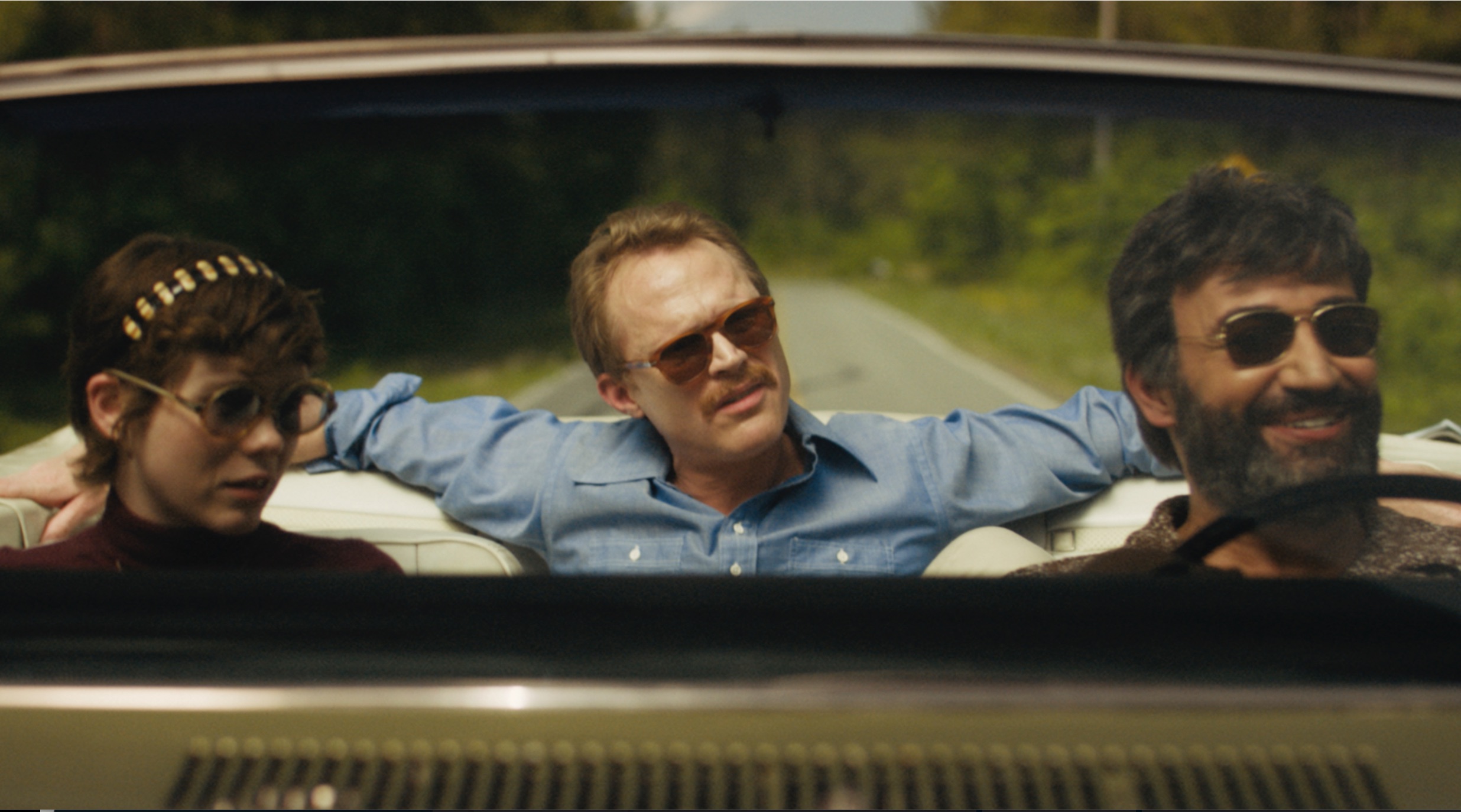What to Watch Verdict
Alan Ball's latest taps into a deep well of pain for LGBTQ+ who experienced difficulty being open with their families, while offering hope to those who have yet to do so.
Pros
- +
* Ball's story yearns towards hope and compassion without sacrificing the painful honesty of some people's hard experiences.
- +
* Bettany taps deeply into Frank's lifelong fear and shame, while Peter Macdissi offers an essential counterbalance of grace, compassion and acceptance.
Cons
- -
* For better or worse, Ball aims to tell Frank's story honestly, but its optimistic ending isn't realistic for everyone in similar circumstances.
Last year when Queen & Slim came out, cultural critics wondered aloud how healthy it is for fictional stories to focus on real-life tribulations without offering a balm to soothe their pain. In that case, director Malina Matsoukas and writer Lena Waithe wrapped their story about lovers on the lam with a bracing, bittersweet finale reiterating sad truths about racial profiling and excessive police force. But if Alan Ball’s new film about a closeted gay man reckoning with his Southern family’s prejudices opts for a more hopeful, perhaps less likely conclusion than he might have actually faced during the film’s 1970s setting (much less now), its impact is no less powerful.
Starring Paul Bettany, Sophia Lillis and Ball’s real-life partner Peter Macdissi, Uncle Frank suggests to gays afraid to be open about their sexualities and their lives that there can be a light at the end of a very dark tunnel. Without flinching from the anxiety and agony that the title character (and many others) experience, Ball’s latest confronts a legacy of shame and self-hatred, passed down from an intolerant parent, family member or friend, and dares to suggest that this burden shouldn’t be carried by the person who already spent too much time seeking approval they did not need.
Framed around Frank’s naïve, ambitious niece Beth (Lillis), whom he inspired at a young age to pursue dreams bigger than the South Carolina town where they both grew up, “Uncle Frank” follows her into early adulthood as Beth arrives fresh and eager in the late 1970s as a student at NYU, where he teaches. Encouraged to crash a party Frank is throwing by a boyfriend with more interest in her uncle, Beth quickly discovers his hidden lifestyle, and the ebullient, sensitive partner, Wally (Macdissi), he’s kept hidden from his family. But before she can fully come to terms with this new context to her uncle’s longtime estrangement from the rest of the family, he receives a call that Daddy Mac (Stephen Root), the Bledsoe paterfamilias and his father, has suddenly passed away.
Frank reluctantly decides to return home for the funeral, and agrees to drive himself and Beth after her mother Kitty (Judy Greer) insists that airplanes are death traps. Telling Wally that his absence will be the best way to support him through this difficult time, Frank leaves with Beth to make the journey home. But his partner rents a car and decides to follow them anyway, eventually cajoling his way into their caravan while agreeing to remain distant during the actual funeral and few family activities to which Frank consented. As they grow closer to his hometown, however, Frank becomes overpowered by memories of his upbringing, including an early relationship with another boy — and pivotally, his father’s discovery of the two of them. With a partner supporting him almost against his will and facing hard conversations he does not want to have with family members he rarely sees, Frank begins to collapse under the weight of his guilt, anger and fear as he wonders if it was worth coming back to experience a wave of feelings he’d long ago suppressed.
Although many LGBTQ+ individuals today still experience the kind of fear that Bettany’s character deals with in Uncle Frank, Ball’s decision to set the film in the late 1970s, still at the dawn of any sort of mainstream gay rights movement, underscores the extent to which his quandary about coming out feels particularly unimaginable. Beth’s youthful inexperience, particularly in early scenes where she wonders in voiceover why there’s such a conspicuous divide between Frank and the rest of the family, comes to embody the simple compassion of this generation’s youth, just not “getting” why this erudite, patient, kind person would be on the outs with anyone. Her education about both Frank and the libertine world of the big city comes at her fast, but it also spotlights how we can fortify ourselves in enclaves of support, and how doing so sometimes blinds us to dealing with certain kinds of adversity, or larger reality, that always seems to come crashing in, whether or not we want it to.
That Daddy Mac’s death doesn’t come as some kind of a relief to Frank speaks to how deeply the shame and anxiety of his youth has become embedded — so much, in fact, that he starts to hate himself and implode when remembering it, even years later. But there is an undeniable fact that for better or worse, we seek our families’ approval, and to be denied that — and become an object of scorn and contempt in their eyes — leaves deep and lasting scars. Well, for some; Ball offers a wonderful counterpoint in the perspective of Wally, who acknowledges that his Middle Eastern mother would never accept him as gay (and he would be executed in his home country), but remains open and endlessly compassionate as he encourages Frank to come out to his family. Macdissi’s joie de vivre in the role is one of the film’s brightest spots, playing the gay relative we all needed at a certain moment in our lives to accept our inexperience or even ignorance and shepherd us gently toward enlightenment.
Bettany is powerful and affecting as Frank, wrestling with demons that he revealed not long ago to What To Watch hit a lot closer to home than in typical roles. To carry a secret, he shows us, is tough enough, but to internalize the negative feelings others have about it when exposed can be deadly. To that end, the specificity of this story may resonate with anyone who has been unable to live freely and fully, and Bettany captures the self-destructive pain that these individuals go through if and when they cannot become their authentic selves. Despite being a sort of narrator and engine driving some of the reflective edges of this story, Lillis’ Beth takes a back seat once the trio begin their road trip South, but her clear-eyed look at the confidence he invested in her, that he’s currently rejecting in the wake of Daddy Mac’s death, provides a necessary mirror for him to see himself honestly.
Again, Macdissi is an absolute revelation, and his honesty with who he is, and who he encourages Frank to be, provides a third leg to support his partner’s emotional journey. But even if many people aren’t able to find companions and support systems to validate and encourage who they are — if they manage to get beyond the kind of fear and shame that Frank holds onto — Ball’s decision to aim for a more graceful and upbeat conclusion to this journey feels deeply welcome even if to some it might ring false. I mean, it’s absolutely true that people come out and their families reject them, or worse. But in a fictional story, what does that teach people who may be considering doing the same in real life? There has to (or at least should) be a safe place to explore these positive alternatives, and Ball does so without flinching away from the potential obstacles or difficulties. In which case, Uncle Frank observes an often-spoken truth, but one that’s always worth remembering: it gets better. That it can be hard, or bad, is undeniable; but if there’s a chance it can lead to healthier, happier things — if not for everyone, then at least for yourself — then this film argues, why not at least try?
Uncle Frank will be available on Amazon Prime Video November 25th, 2020.
Todd Gilchrist is a Los Angeles-based film critic and entertainment journalist with more than 20 years’ experience for dozens of print and online outlets, including Variety, The Hollywood Reporter, Entertainment Weekly and Fangoria. An obsessive soundtrack collector, sneaker aficionado and member of the Los Angeles Film Critics Association, Todd currently lives in Silverlake, California with his amazing wife Julie, two cats Beatrix and Biscuit, and several thousand books, vinyl records and Blu-rays.












